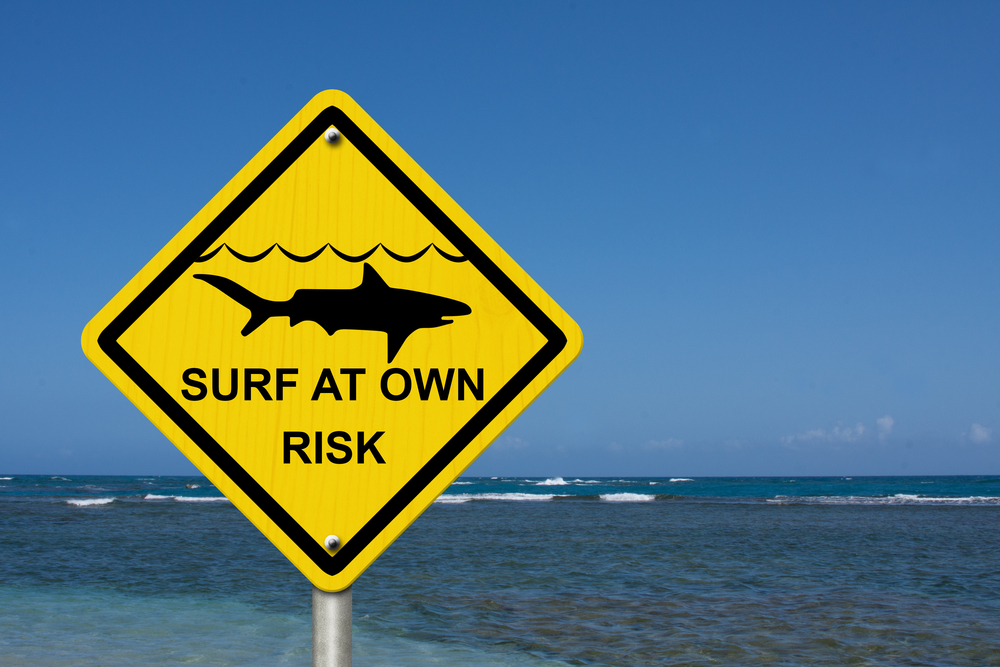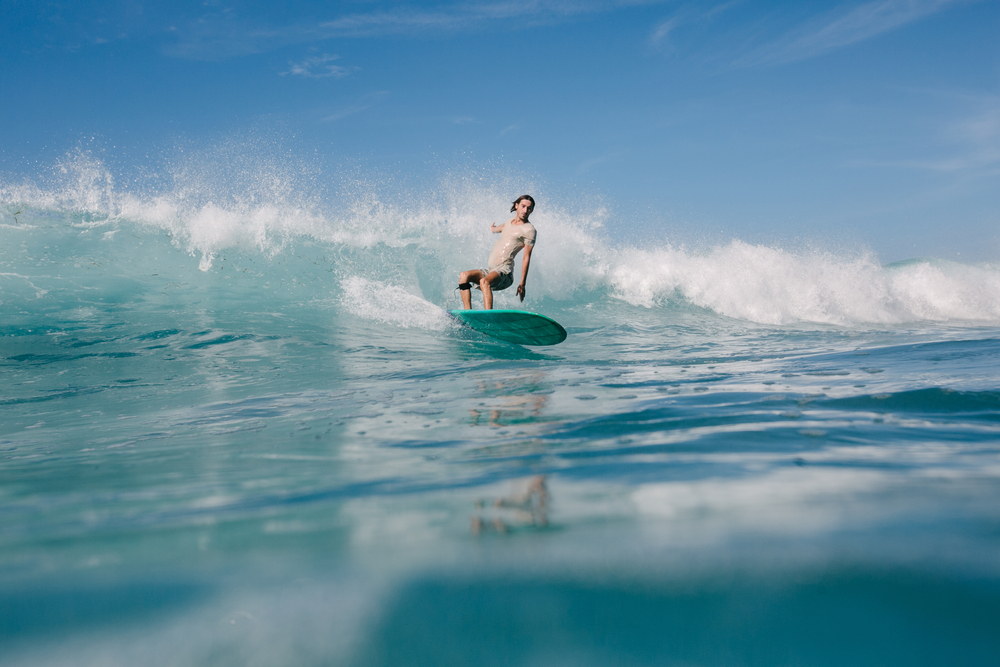There is no denying that surfing is one of the most romantic and exciting watersports out there, if movies like Blue Crush and Ride Your Wave are anything to go by.
In fact, you’ve probably dreamed of heading to the nearest beach and hopping on a board to try your hand at surfing.
You might have even wondered how long it would take before you’re effortlessly cruising along the waves just like all those beautiful people on screen.
Now, if you’ve ever asked a good surfer how they got to their skill level, you’ll probably get one answer:
“I surf every day.”
It might sound like a cliched answer, but could there be truth in it?
Can you surf every day? Or, more to the point, should you surf every day if you want to get good at it?
Let’s find out!
Can You Surf Every Day?

The simple answer is no, you can’t possibly surf every day.
Even if you have surfing skills and gear available and you’re lucky enough to live near a beach with good waves, you will still be dependent on wind and water conditions for a safe and enjoyable ride.
Since surfing relies heavily on the speed and direction of both water and wind to create the perfect swells, there will be days when conditions are not optimal for surfing. This is especially true if you live in areas with storm season.
You also have to consider the local marine life. Jellyfish and sea urchins are only some of the marine animals that can make surfing unpleasant!
Sure, you can probably drive to another location with more favorable conditions, but it will take such a huge toll on your time, energy, and money in the long run that it might not be worth it.
If indoor surfing facilities are available in your area, that might be a good option, but nothing beats the beauty and experience of real waves.
How Often Should You Go Surfing?

Assuming that weather conditions are favorable for surfing, there is no reason not to enjoy the sport as often as you can.
As a sport, surfing is undeniably fun and exciting, especially since you’ll experience a unique session each time you go out. After all, no two waves are ever alike!
Your physical condition might be the only factor you should take into consideration.
Since surfing is a physically demanding sport, you do need to be in reasonably good condition to stay safe and enjoy the activity.
You’ll be doing a fair amount of paddling and popping up, not to mention using your core, back, and leg muscles to stay upright and balanced on your board.
It goes without saying that you should also be a strong swimmer since you would probably be a good distance away from the shore.
After any surfing session, you should expect to feel sore all over since surfing utilizes most of your muscle groups. Much of the soreness might be concentrated in your arms, legs, and shoulders since you’ll be using these muscles often while surfing.
Pros of Surfing When Possible

If you are able to surf on a regular basis, you’ll reap a lot of physical, emotional, and mental benefits.
1. Lots of “Happy” Hormones
Any physical activity produces feel-good hormones in the body, particularly dopamine and endorphins.
These hormones are responsible for that happy and satisfying feeling you get after a good exercise session.
Coupled with the natural beauty of surfing locations, it’s not surprising why you feel upbeat after surfing!
2. Cardio and Strength Training
You’re doing both cardio and strength training every minute you’re out on the waves.
Paddling and popping up on the board engages your arms, chest, back, and shoulder muscles as you move through water resistance.
Popping up on your board and staying balanced while riding the waves utilizes your core, lower back, and leg muscles.
Since you’re constantly moving, your heart and lungs are getting a continuous cardio workout! Bonus time, you’re breathing in the fresh and clean ocean breeze, which is a special treat if you live in the city.
3. Stress Relief
Exercise by itself has already been proven to be a great way to relieve stress, but if you combine it with a beautiful setting such as a beach, there’s nothing better!
Surfing helps reduce stress and anxiety, leading to a more relaxed mental and emotional state. You’re likely to spend the rest of your day in a good mood after a morning surfing session.
You’re also more likely to sleep better when you regularly surf since you’re physically tired and in a good mental state.
4. Master Skills Faster
As the saying goes, “you need 10,000 hours of intensive practice to achieve mastery of a certain skill.”
While you might not have the time or inclination to devote 10,000 hours to master surfing on a professional level, going surfing every day will no doubt hone your skills.
You’ll be able to perfect the fundamentals enough to move on to more advanced locations with larger swells.
Even if you only go surfing on vacation, being able to meet the challenge of advanced surfing locations is a reward in itself.
Downsides of Surfing Every Day

While the benefits of surfing every day are good reasons to get on your board whenever possible, there are a few cons that you should remember.
1. Sunburn
Have you ever gone swimming and enjoyed yourself so much that you didn’t even notice that you’ve already gotten sunburned?
It’s the same with surfing! Prolonged exposure to sunlight can easily damage your skin. Surfers might even argue that surfing can pose a bigger danger of sunburn since it is not advisable to go surfing at night.
Even if you’re wearing a wetsuit or a rash guard, your face, hands, and feet are continuously exposed to sunlight.
Always wear sunscreen before surfing and make sure to re-apply them after a couple of hours in the water.
2. Surfer’s Eye
Surfer’s eye is the common name for a medical condition known as pterygium. Pterygium occurs when the conjunctiva of the eye becomes damaged due to the constant exposure of glare from the sunlight coming off the water.
Some surfers protect themselves by wearing goggles while surfing.
When possible, avoid surfing when there is harsh sunlight. Go early in the morning or late in the afternoon.
3. Encountering Dangerous Marine Life
The more you surf, the greater the chance of encountering dangerous marine life. Depending on where you live, you can encounter creatures such as sea urchins, sea snakes, jellyfish, or even sharks!
Always be aware of safety announcements from your local marine agencies. If you are not familiar with the sea life in an area, do your research before going out to surf.
You can also ask the locals if there are any sea creatures that you should look out for.
4. Exhaustion
Surfing is a physically demanding sport that requires you to engage most, if not all, of the major muscle groups in your body.
Don’t be surprised if you feel sore and tired the day after you go surfing.
Even if you wanted to surf every day, it’s not advisable to push your body to the limits by going out surfing on consecutive days. No matter how much you love the sport, there will come a point when it’s not physically possible to surf.
Experts recommend that you rest for at least 48 hours once you feel tired and sore from a few days of surfing.
Conclusion
Surfing every day is a great way to get your daily exercise in, relieve stress, and improve your surfing skills.
Just make sure that the conditions are safe and you’re in a good physical and mental state to avoid injuries.
Is it a sunny day and the water is calling you? What are you waiting for? Head on over to the nearest beach and grab some waves!









